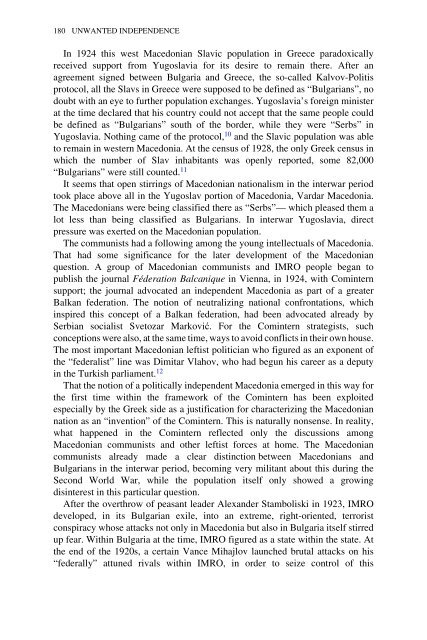Yugoslavia: A History of its Demise - Indymedia
Yugoslavia: A History of its Demise - Indymedia
Yugoslavia: A History of its Demise - Indymedia
Create successful ePaper yourself
Turn your PDF publications into a flip-book with our unique Google optimized e-Paper software.
180 UNWANTED INDEPENDENCE<br />
In 1924 this west Macedonian Slavic population in Greece paradoxically<br />
received support from <strong>Yugoslavia</strong> for <strong>its</strong> desire to remain there. After an<br />
agreement signed between Bulgaria and Greece, the so-called Kalvov-Politis<br />
protocol, all the Slavs in Greece were supposed to be defined as “Bulgarians”, no<br />
doubt with an eye to further population exchanges. <strong>Yugoslavia</strong>’s foreign minister<br />
at the time declared that his country could not accept that the same people could<br />
be defined as “Bulgarians” south <strong>of</strong> the border, while they were “Serbs” in<br />
<strong>Yugoslavia</strong>. Nothing came <strong>of</strong> the protocol, 10 and the Slavic population was able<br />
to remain in western Macedonia. At the census <strong>of</strong> 1928, the only Greek census in<br />
which the number <strong>of</strong> Slav inhabitants was openly reported, some 82,000<br />
“Bulgarians” were still counted. 11<br />
It seems that open stirrings <strong>of</strong> Macedonian nationalism in the interwar period<br />
took place above all in the Yugoslav portion <strong>of</strong> Macedonia, Vardar Macedonia.<br />
The Macedonians were being classified there as “Serbs”— which pleased them a<br />
lot less than being classified as Bulgarians. In interwar <strong>Yugoslavia</strong>, direct<br />
pressure was exerted on the Macedonian population.<br />
The communists had a following among the young intellectuals <strong>of</strong> Macedonia.<br />
That had some significance for the later development <strong>of</strong> the Macedonian<br />
question. A group <strong>of</strong> Macedonian communists and IMRO people began to<br />
publish the journal Féderation Balcanique in Vienna, in 1924, with Comintern<br />
support; the journal advocated an independent Macedonia as part <strong>of</strong> a greater<br />
Balkan federation. The notion <strong>of</strong> neutralizing national confrontations, which<br />
inspired this concept <strong>of</strong> a Balkan federation, had been advocated already by<br />
Serbian socialist Svetozar Marković. For the Comintern strategists, such<br />
conceptions were also, at the same time, ways to avoid conflicts in their own house.<br />
The most important Macedonian leftist politician who figured as an exponent <strong>of</strong><br />
the “federalist” line was Dimitar Vlahov, who had begun his career as a deputy<br />
in the Turkish parliament. 12<br />
That the notion <strong>of</strong> a politically independent Macedonia emerged in this way for<br />
the first time within the framework <strong>of</strong> the Comintern has been exploited<br />
especially by the Greek side as a justification for characterizing the Macedonian<br />
nation as an “invention” <strong>of</strong> the Comintern. This is naturally nonsense. In reality,<br />
what happened in the Comintern reflected only the discussions among<br />
Macedonian communists and other leftist forces at home. The Macedonian<br />
communists already made a clear distinction between Macedonians and<br />
Bulgarians in the interwar period, becoming very militant about this during the<br />
Second World War, while the population <strong>its</strong>elf only showed a growing<br />
disinterest in this particular question.<br />
After the overthrow <strong>of</strong> peasant leader Alexander Stamboliski in 1923, IMRO<br />
developed, in <strong>its</strong> Bulgarian exile, into an extreme, right-oriented, terrorist<br />
conspiracy whose attacks not only in Macedonia but also in Bulgaria <strong>its</strong>elf stirred<br />
up fear. Within Bulgaria at the time, IMRO figured as a state within the state. At<br />
the end <strong>of</strong> the 1920s, a certain Vance Mihajlov launched brutal attacks on his<br />
“federally” attuned rivals within IMRO, in order to seize control <strong>of</strong> this
















